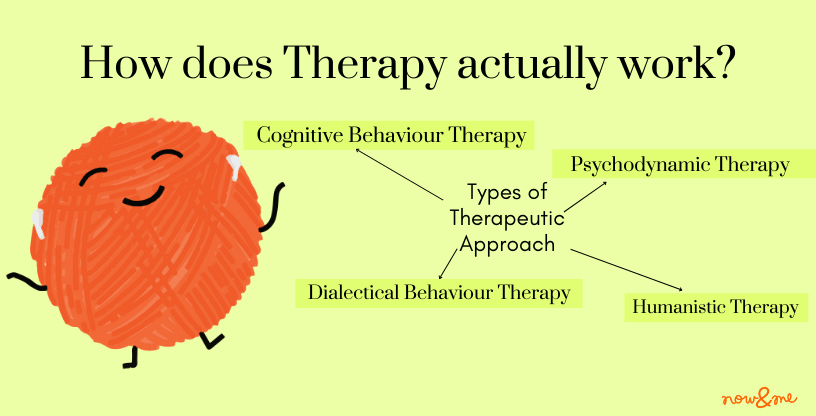Therapy is a process that looks like just “talking” sometimes. But in fact, therapy is a journey which is taken with a professional with whom we can talk about whatever we want to talk about! Psychologists apply research-based techniques to help people develop more effective habits. It is a collaborative process with a trained therapist.
Why is therapy important for mental health? It's known that 75% of the people who take therapy experience great benefits. The goal of therapy is to facilitate change, and it can help you navigate life by helping you feel empowered, informed and just attuned. Therapy can bring a lot of insights into your life and help you make healthier choices and build coping strategies to manage your well-being.
Now let's know different types of therapy approaches to help you make the right choice: There are various types of therapeutic approaches that a professional can choose to follow, given the requirement of the individual and the experience of the therapist. Read more to know about some of the common types of therapy and how they work.
Approaches to Therapy: Therapeutic Techniques
Psychodynamic Therapy
What Is It?
- A long term process
- Understanding the connection between your decisions, your unconscious mind and past experiences
- Examining and exploring your emotional, thought and relationship patterns
When Is It Used?
- Depression
- Anxiety
- Substance use disorders
- Bipolar disorder
Dialectical Behaviour Therapy
What Is It?
- Finding balance between change and acceptance
- Focuses on patterns of behaviour and reactions that cause distress
- Doesn’t involve reflections on unconscious thoughts or emotional difficulties
When Is It Used?
- Developed especially for BPD
- Eating disorders
- Post traumatic stress disorder
- Substance abuse
- Mood disorders
Cognitive Behaviour Therapy
What Is It?
- A short(er) term approach
- Understanding the relationship between an individual's thoughts and behaviour
- Identifying patterns and how they’re affecting your life
- Instilling critical thinking for the benefit of the individual
When Is It Used?
- Anxiety disorders
- Depression
- Trauma related disorders
- OCD
- Mood and eating disorders
Humanistic Therapy
What Is It?
- Deploys an accepting, self exploratory and holistic sense of understanding of self
- Focuses on knowing yourself better and work with the therapist to garner a strong sense of self and focus on being a bigger version of yourself
- The individual leads these sessions and the therapist either follows up through empathy or unconditional positive regard to the individual
When Is It Used?
- Self esteem issues
- Depression
- Relationship issues
- Difficulty in coping with health issues
- Post Traumatic Stress Disorder
- Navigating feeling lost in life
There are so many therapeutic approaches, but at the end of the day, what works for you is going to be a process that may take some time to figure out. Speak with your therapist about exploring these approaches and what their approach is. Application and theory often differ, but information is power :)
Therapy vs Medication
In therapy, you're working with a professional and share your emotional, behavioural and mental issues that cause you distress. However, in medication, you're prescribed medical drugs by a psychiatrist based on the best available scientific evidence and your willingness to try medical treatments. However, in a lot of cases, the combination of the two is also used depending upon the requirement of the individual.
Is Life Coaching Similar to Therapy?
Similar, yes. But it is not the same. Life coaching is more goal-oriented and more decision-oriented. A therapist facilitates or empowers the change in you, and life coaches are a bit more involved in these changes. Therapy focuses more on overall well-being, while life coaching often has specific identified goals.
What Does Successful Therapy Look Like?
Therapy is a long term, non-linear process of understanding yourself better and actively working on yourself. In such a case, measuring success in therapy could be difficult because it varies from individual to individual. However, you can set personal goals for yourself for the specific issues you're working on and then analyse them through self-reflection. It's the individual's understanding of growth and quality of their relationship with themselves that can help them measure progress or success in therapy.
All that said, it's never too late to ask for help. If exploring therapy has crossed your mind once or twice, then take a small step and try it out. It has worked wonders for people, and it truly is a life-changing experience that puts a lot of things about life into perspective. However, I understand that it's not easy, so it's okay if you don't feel ready. But know that if you do feel like the time is right, Therapy&Me is here for you and book a session with a mental health professional.
About Therapy&Me:
You can now take therapy with Now&Me! Therapy&Me is a feature added to our platform where we have partnered up with a few qualified therapist partners who work with a variety of issues. Come explore!
FAQs Answered by Shaifila, Our In-House Psychologist
1. How Long Does Therapy Take to Work?
Therapy is a process. So for us to determine how long it would take for it to “work” we need to define what it means for it to be “working”. Allow yourself some time to involve yourself in the process. The problem sometimes is accessibility because therapy is emotionally consuming, sometimes money is an issue, sometimes investing so much time is difficult so I do suggest that you keep in mind a chunk of 10 sessions to see clearly where you are and what is it that you need further. But as therapists, we understand that there may be breaks in between, get this on the table. Come up with a plan with your therapist!
2. What Is The Difference Between Therapy and Psychotherapy?
No difference.
